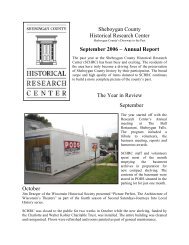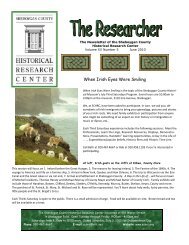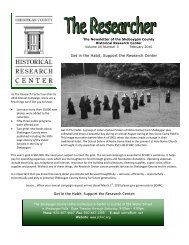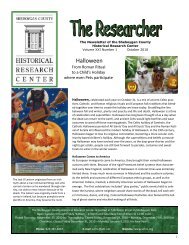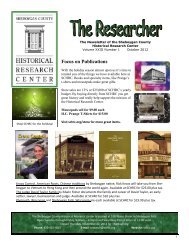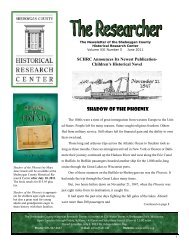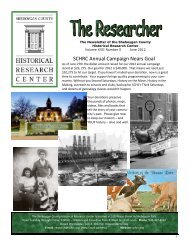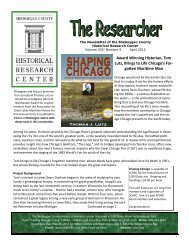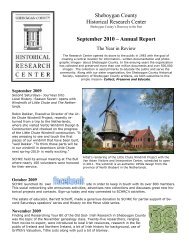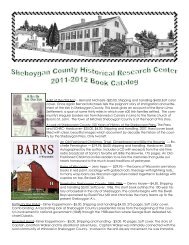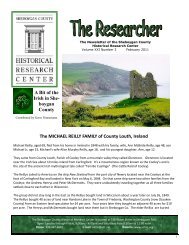New Local History Books Available - Sheboygan County Historical ...
New Local History Books Available - Sheboygan County Historical ...
New Local History Books Available - Sheboygan County Historical ...
You also want an ePaper? Increase the reach of your titles
YUMPU automatically turns print PDFs into web optimized ePapers that Google loves.
German Genealogy<br />
familytreemagazine.com<br />
A linguistics professor by the name of Arta Johnson<br />
was a genealogist with a knack for storytelling. One<br />
of her favorite yarns was about a researcher who<br />
came to her, frustrated that he’d found the name<br />
of his family’s village of origin on the immigrant<br />
ancestor’s tombstone, but had never found the<br />
town on a map.<br />
When asked the name of the town, he replied,<br />
“Gross Herzogtun, Baden” which, as it turns out,<br />
isn’t a village name, but German for “Grand Duchy<br />
of Baden.” So don’t make the same mistake,<br />
familiarize yourself with these other place names<br />
related to the type of noble who ruled them:<br />
Furstentum: Principality – a territory ruled by a<br />
Fürst, German for Prince. Grafschaft: Often<br />
translated as county, which gives an incorrect<br />
sense of the word in English. A Grafschaft was<br />
ruled by a Graf, German for county, so countship<br />
might be a better translation. Herrschaft: Land<br />
ruled by a local lord, or Herr. Herzogtum: German<br />
for duchy, ruled by a Herzog (duke). Konigreich:<br />
Territory ruled by a König (king). Kurfürstum: A<br />
principality whose prince was also one of the<br />
electors of the Holy Roman Emperor. Reichstadt: A<br />
free imperial city of the Holy Roman Empire.<br />
Rittergut: A knight’s estate, which at times was an<br />
independent territory. For a complete chart of<br />
German noble titles, visit<br />
. Most<br />
German nobles’ surnames were preceded by the<br />
preposition von (meaning of or from), but don’t<br />
jump to the conclusion that your Von Kleindorf<br />
ancestors were bluebloods. In the 18 th and 19 th<br />
centuries, noble families had little incentive to<br />
emigrate – the von was more than likely added in<br />
America.<br />
Meyers Orts -<br />
Step by Step<br />
familytreemagazine.com<br />
The seminal handbook for tracking down German<br />
villages goes by the title Meyers Orts- und<br />
Verkehrs-Lexikon des Deutschen Reiches. You’ll find<br />
this resource on Ancestry.com, but it takes a little<br />
help to use effectively. Here’s a 1-2-3 from the<br />
folks at the Mid-Atlantic Germanic Society:<br />
1. On the Ancestry.com home page, go to the link<br />
for Card Catalog.<br />
2. Enter the words Meyers under Database Title<br />
and click Search.<br />
3. Click on the search result Meyers Gazetteer of<br />
the German Empire.<br />
4. In the Location search box, enter the name of<br />
the town. Don’t check the “exact matches only”<br />
box.<br />
5. If you don’t get any hits or wind up on the wrong<br />
page, go back to the Location search box and enter<br />
at least the first three letters of the town name<br />
followed by an asterisk (*).<br />
6. Search the results for the town or one that<br />
sounds similar to the spelling you have, and call up<br />
the page from Meyer Orts- by clicking View Record,<br />
then View Original Image.<br />
7. If you discover several towns with the same<br />
name, look for the one or two that are in the<br />
correct German state.<br />
8. See Wendy K. Uncapher’s How to Read and<br />
Understand Meyers Orts- (Origins, $8) to interpret<br />
what you find.<br />
GenealogyBank (www.genealogybank.com) is a leading online genealogical resource from <strong>New</strong>sBank, inc. Featuring a<br />
wealth of exclusive material-including modern obituaries and historical newspapers, books, pamphlets, military records,<br />
government documents and more-GenealogyBank helps you discover fascinating information about your family history.<br />
GenealogyBank's 2,400+ historical newspapers include letters, speeches, opinion pieces, advertisements, hometown news,<br />
photographs, illustrations and more. These unique primary documents go beyond names and dates, providing first-hand<br />
accounts that simply aren't available from census or vital records alone.



